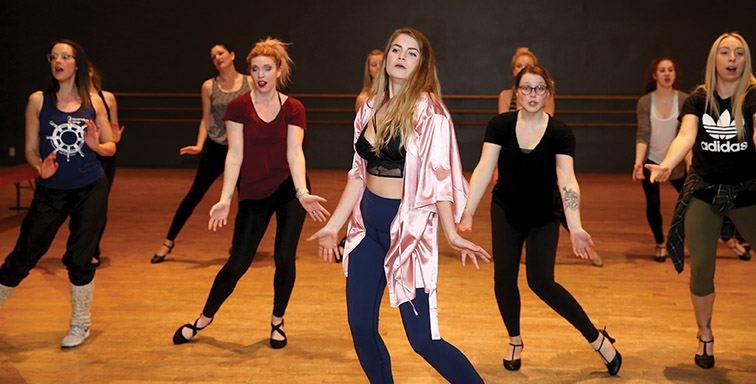If you have been reading The Citizen over the last few days you will have seen a few articles about the production of the musical Cabaret that is currently playing at the Prince George Playhouse.
I also want to use my column this week to talk about the show but I need to start with a disclaimer: I have been involved with the show since rehearsals began. I have had the great privilege of being the assistant to the director, Judy Russell. I say privilege because anyone who lives in Prince George and region likely knows of her extraordinary talent as a director and as a choreographer but what you may not know is that she is also a generous teacher and I have learned a great deal at her side watching her breathe life into this exquisite production.
I have also spent a great deal of time thinking about the story's relevance and the decision to stage the show in 2018. Sean Farrell and Frank Peebles both provided excellent contextual details about the show in their recent columns. Farrell describes the periods of the 1920s and the 1930s as a time "of the most traumatic shifts ever in a society [..in which there was] the complete loss of a moral compass, and in its vacuum, the rise of ultra nationalism and extreme fascist theology. The Weimar Republic could be considered the official handbook for how a society can self-destruct on every single level."
If you are not familiar with the musical, the action takes place in 1931 in a cabaret nightclub in Berlin and in a boarding house where a mix of characters live and work. Cliff Bradshaw is an American who has come to Berlin to write a novel. He is, as are most writers, on an extremely limited budget. He finds his way to the boarding house on the advice of Ernst Ludwig who Bradshaw meets on the train on his way to Berlin. Ludwig draws Bradshaw into Berlin's racy underworld of the Kit Kat Klub where he meets the exquisite Sally Bowles. As the story unfolds we see the way that Berlin fell apart under the guise of the lure of nationalist sentiment.
Nationalism is an odd phenomenon because it creates a strange sense of belonging to an "imagined community." Among social scientists the term "imagined community" is associated with the theorist Benedict Anderson who wrote about the origin and spread of nationalism. He said, "[... nationalism] is imagined as a community, because, regardless of the actual inequality and exploitation that may prevail in each, the nation is always conceived as a deep, horizontal comradeship. Ultimately it is this fraternity that makes it possible, over the past two centuries, for so many millions of people, not so much to kill, as willingly to die for such limited imaginings. These deaths bring us abruptly face to face with the central problem posed by nationalism: what makes the shrunken imaginings of recent history (scarcely more than two centuries) generate such colossal sacrifices?"
Of course stories like Cabaret ask how nationalism makes people willing to kill, to hate and to "other" people into categories that strip them of their humanity. The writers of Cabaret, Masteroff, Kander and Ebb, weave this question throughout the play and they do so in both subtle and not so subtle ways.
For me one of the most critical parts of the play comes in a moment that seems innocuous among all the other blatant moments that lay bare the rise of jingoism. When Cliff first meets Sally Bowles in the club she asks him to speak to her just so that she can hear him speaking English.
"I'm starved," she says. Cliff then begins to recite a poem.
Now the playwrights could have chosen among thousands of poems so I don't think it was an accident that they chose "Casey at the Bat" a famous American poem published 1888 with the subtitle: "A Ballad for the Republic."
Ostensibly the poem is about the great American pastime of baseball and the overconfidence of the protagonist Casey who strikes out with players on second and third base. Cliff recites a part of the poem and when Sally asks him to keep going he says that he can't remember any more. The fact is that he can't remember anymore because he has started at the last stanza. He missed out the parts of the poem where a fan yells, "Kill him! Kill the umpire!" and where Casey's demeanor turns dark: "the sneer is gone from Casey's lips, his teeth are clenched in hate, he pounds with cruel violence his bat upon the plate; and now the pitcher holds the ball, and now he lets it go, and now the air is shattered by the force of Casey's blow."
The fact is that it is easy to forget how we go from a game to place of hatred and how easily nationalism can change from patriotism to jingoism. So we need to be reminded and that's why we need to see Cabaret not just in 2018 but every year.



